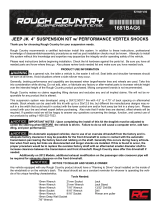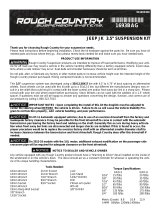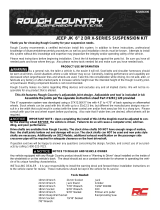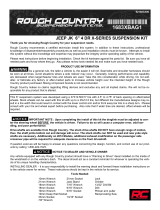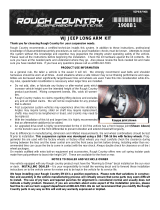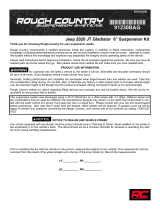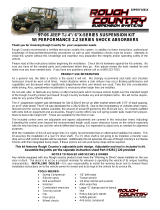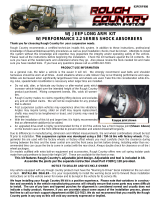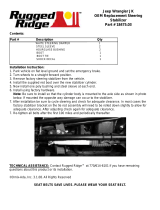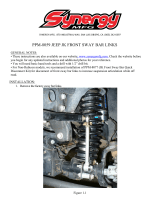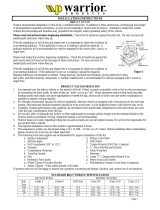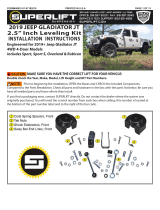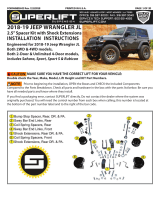
JEEP JK 4” SUSPENSION KIT
Thank you for choosing Rough Country for your suspension needs.
Rough Country recommends a certified technician install this system. In addition to these instructions, professional
knowledge of disassemble/reassembly procedures as well as post installation checks must be known. Attempts to install
this system without this knowledge and expertise may jeopardize the integrity and/or operating safety of the vehicle.
Please read instructions before beginning installation. Check the kit hardware against the parts list. Be sure you have all
needed parts and know where they go. Also please review tools needed list and make sure you have needed tools.
PRODUCT USE INFORMATION
As a general rule, the taller a vehicle is, the easier it will roll. Seat belts and shoulder harnesses should
be worn at all times. Avoid situations where a side rollover may occur.
Generally, braking performance and capability are decreased when larger/heavier tires and wheels are used. Take this
into consideration while driving. Do not add, alter, or fabricate any factory or after-market parts to increase vehicle height
over the intended height of the Rough Country product purchased. Mixing component brands is not recommended.
Rough Country makes no claims regarding lifting devices and excludes any and all implied claims. We will not be re-
sponsible for any product that is altered.
This suspension system was developed using a 35X12.50X17 tire with 4.5” to 4.75” of back spacing on aftermarket
wheels. Stock wheels can be used with this kit with up to a 35x12.5 tire, but different tire manufactures designs may re-
sult in a tire width that could result in contact with the lower control arm and/or front sway bar link in a sharp turn. Please
consult with your tire and wheel expert before purchasing. Also note that if wider tires are desired, offset wheels will be
required. If question exist we will be happy to answer any questions concerning the design, function, and correct use of
our products by calling 1-800-222-7023.
IMPORTANT NOTES : Upon completing the install of this kit the draglink must be adjusted to
center the steering wheel BEFORE the vehicle is driven. Failure to do so will cause a computer error, odd han-
dling, and poor performance.
On Automatic equipped vehicles; due to use of an oversize driveshaft from the factory and inad-
equate factory clearance it may be possible for the front driveshaft to come in contact with the automatic trans-
mission pan tearing the factory boot and rubbing on the shaft. Generally this occurs during heavy articulation
when front sway bar links are disconnected and longer shocks are installed. If this is found to occur, the proper
procedure would be to replace the oversize factory shaft with an aftermarket smaller diameter shaft to increase
clearance between the transmission and front driveshaft. Rough Country does offer this driveshaft if needed.
Additionally on 2012 Models, additional exhaust modification on the passenger side crossover pipe will be re-
quired for adequate clearance on the front driveshaft.
NOTICE TO DEALER AND VEHICLE OWNER
Any vehicle equipped with any Rough Country product should have a “Warning to Driver” decal installed on the inside of
the windshield or on the vehicle’s dash. The decal should act as a constant reminder for whoever is operating the vehi-
cle of its unique handling characteristics.
Tools Needed:
10mm Wrench 21mm Socket Jack
14mm Wrench 21mm Wrench Jack Stand
18mm Wrench 7/16” Wrench 13/32” Drill Bit
18mm Socket 9/16” Wrench Drill
19mm Wrench 9/16” Socket Pitman arm puller
19mm Deep Well Socket
7/8” Wrench
13/16” Socket
921681000B
*1681BAG7*
1681BAG7

KIT CONTENTS
Kit Box 1681/1682
Qty Description
2 Rear sway bar links
1 Rear track bar bracket
4 Brake line bracket
1 Kit bag
1 Kit Bag
1 Front Track bar bracket
1 Stab Bracket
1 Pitman arm
2 Rear Coil Shims
1681 For 4 Door Applications
2 Front coil spring 4 door
2 Rear coil spring 4 door
1682 For 2 Door Applications
2 Front coil spring 2 door
2 Rear coil spring 2 door
1681 Kit Bag
Qty Description
1 Track bar bracket sleeve
4 .250– 20 x 1.00” bolt
4 .250-20 nylock nut
8 .250 flat washer
7 .375 washer
4 .375-16 x1.25 bolt
4 Cross-member washer
3 .375-16 x 1” bolt
1 14mm x 75mm Bolt
2 14mm X 80mm Bolt
3 14mm Nylock nut
9 .375-16 Flange Lock nut
1 3/8” x 2 1/2” x 3 1/4” U-bolt
1 Rear Track Bar Bracket Sleeve
1681 Kit Bag3—Sway Bar Link Bag
4 Sleeve
4 .50-12 x 2 3/4” bolt
4 .50-12 lock nuts
8 .50 washer
1081 Bag—Cam Bolt Bag
2 Cam Bolts
1020 Bag—Frt Shock Relocation
2 9/16 x 1.5” Bolt
4 9/16” Flat Washer
2 9/16 Top Lock Nut
2 1/2” 1.25” Bolt
4 1/2” Washer
2 1/2 Nylock Nut
1681 Box2
Qty Description
2 Rear N3 Shock
2 Rear N3 Shock
2 Front Shock Hardware
2 Front Shock Brackets
1 Shock Bracket Hardware

TORQUE SPECIFICATIONS
Size Grade 5 Grade 8
5/16” 15 ft/lbs 20 ft/lbs
3/8” 30 ft/lbs 35 ft/lbs
7/16” 45 ft/lbs 60 ft/lbs
1/2” 65 ft/lbs 90 ft/lbs
9/16” 95 ft/lbs 130 ft/lbs
5/8” 135 ft/lbs 175 ft/lbs
3/4” 185 ft/lbs 280 ft/lbs
Metric (Grade) 8.8 10.9 12.9
14MM 85ft/lbs 120ft/lb. 145ft/lbs
Front Track Bar Bracket
Brake Line Brackets
Rear Performance N3 Shocks
Front Performance N3 Shocks
Pitman Arm
Rear Track Bar Bracket
Rear Sway Bar Links
Rear Coil Springs
Front Coil Springs
Stabilizer Mount
Cam Bolts
Rear Coil Shims
Front Shock
Reloc Brkt
Front Shock
Reloc Brkt

FRONT INSTALLATION INSTRUCTIONS
1. Prior to installing this kit, with the vehicle on the ground, measure the heights of your vehicle. This measurement can
be recorded from the center of the wheel straight up to the top of the inner fender lip. Record the measurements.
LF:__________ ,RF:___________,
LR:__________, RR:___________
2. Place vehicle in park and chock the rear wheels. Raise the front of the vehicle with a jack and secure a jack stand
beneath each frame rail behind the front control arms. Ease the frame down onto the stands.
3. Remove the front tires/wheels, using a 19mm deep well socket.
4. Using a 21mm socket, remove bolt securing the front track bar to the axle. See PHOTO 1. Retain stock hardware.
5. Using a 18mm socket and wrench remove the bottom sway bar bolts. Using a 21mm socket and 21mm wrench, re-
move the top of the sway bar link. Retain hardware for later use. See PHOTO 2. (Factory rear links will be moved to
front in later step.)
6. Remove the lower shock bolt using a 18mm socket and
wrench. Using a 14mm wrench unbolt the top of the shock
and remove. See PHOTO 3. Retain stock hardware.
7. Using a 21mm socket and wrench loosen the upper and
lower control arm bolts at the axle and frame, but do not
remove.
8. On some models it will be necessary to remove the brake
line bracket from the frame to allow the coils to be removed.
Using a 10MM socket, remove the brake line bracket from
the stock location.
9. Push down on the axle to allow room for the coils to be re-
moved. Remove stock coil springs. Retain coil isolators.
PHOTO 3
PHOTO 2 PHOTO 1

10. Using a 21mm wrench, remove the bolts that secure the lower link arms to the axle. The OE lower control mounts
are perforated from the factory. The perforated sections must be removed to accept the new cam bolts supplied in
the kit. The perforated sections can be removed with a rotary grinding tool or a chisel. See PHOTO 4.
11. After the perforated sections have been removed, install the supplied cam bolts. The cam bolts should be installed
from the outside. Snug, but do not tighten at this time. See PHOTO 5.
12. Be sure the factory rubber isolators are in place and install the front coil springs. Insert the coil into the upper tower
first, followed by the lower seat. Be sure that the coils are rotated so that they seat properly. Raise the axle enough
to hold the coil springs in place.
13. Using a 21mm socket remove the tie rod end from the pitman arm. Remove the pitman arm nut using a 33mm sock-
et.
PHOTO 4 PHOTO 5

14. A pitman arm puller will be needed to remove factory pitman arm. See PHOTO 6.
15. Install the new pitman arm with the stock hardware and tighten using a 33mm socket. Tighten to 185 ft/lbs. See
PHOTO 7. Reinstall the drag link on the new pitman arm with the stock nut and using a 21mm wrench.
16. Locate the shock relocation bracket and position on the inside of the factory upper shock tower. Apply thread-lock
and insert the 5/8” x 1.5” bolt and washer into the rear hole of the relocation bracket though the factory shock mount
hole. Place the 5/8”, thick washer and nut on top of the shock tower and tighten with a 15/16” socket and wrench.
See PHOTO 8.
17. Apply thread lock to the 1/2” hardware and place the 1/2” x 1.25” bolt and washer though the slotted hole in the relo-
cation bracket and the factory hole in the side of the shock tower. Insert 1/2” washer and nut on the back side of the
shock tower and tighten with a 3/4” socket and wrench. See PHOTO 9.
18. Repeat for opposite side.
19. Install the 660740 front shock—piston up. Position the
cup washer and stem bushing on the stem end of the
shock and insert the stem in the upper shock tower. In-
stall the remaining bushing and washer and loosely se-
cure using the supplied nut. Tighten until the bushing
swells slightly.
20. Attach the lower end of the shock to the axle and secure
using the stock hardware. Tighten to 80 ft.lbs.
21. Remove the stock stabilizer and bracket from the axle
mount using a 18mm wrench See PHOTO 10.
PHOTO 7 PHOTO 6
PHOTO 10
PHOTO 8 PHOTO 9

22. Install the track rod bracket as shown on the stock mount. Install the crush sleeve and stock hardware as shown in
PHOTO 9 & 10. Do not tighten at this time.
23. Install the supplied u-bolt and nuts in the bracket as shown in PHOTO 11. Do not tighten at this time.
24. Install the two 3/8” x 1 1/4” bolts, washer and nuts in the new bracket and supplied stabilizer bracket if reusing the
stock stabilizer in the far left holes as shown. If not installing the stock stabilizer, the two 3/8” x 1 1/4” bolts will be
installed in the two far left holes in the bracket with out the supplied stabilizer bracket. See PHOTO 12.
25. Drill the rear mount using a 3/8” drill bit and install the 3/8” x 1 1/4” bolt, washer and flange lock nut. See PHOTO 13.
26. Tighten all 3/8” hardware using a 9/16” wrench.
27. This next two steps will be performed if the stock stabilizer is retained. On 07-10 Models mark the location on
the factory tie rod bracket on the tie rod and loosen the u-bolt nuts using a 13mm wrench. Slide the bracket down 1
1/4” rotate to position the stud up as shown and retighten tie rod end bracket. See PHOTO 14.
PHOTO 12
PHOTO 11
PHOTO 13 PHOTO 14
PHOTO 10
PHOTO 9

28. On 2011 models loosen the tie rod bracket using a 15mm wrench. Mark original location and move the bracket 1
1/2” and rotate the tie rod bracket as shown to allow full stroke of the stabilizer cylinder. See PHOTO 17.
29. Install the factory stabilizer in the new track rod / stabilizer mount with the body of the stabilizer on the axle mount
with stock hardware and tighten using a 18mm socket / wrench. See PHOTO 18.
30. Install the stock track bar into the new track rod bracket using the supplied 14mm x 80mm bolt, flat washers and lock
nut. Tighten using a 21mm & 22 mm socket / wrench.
31. On the rear of the vehicle remove the factory sway bar link using a 18mm socket and wrench on the lower. Remove
the upper hardware using a 18mm wrench and a 19mm wrench on the ball joint end.
32. Install the factory rear sway bar link in place of the factory front sway bar link. Attach the swivel end of the link to
the factory sway bar using the stock hardware. Line up the eye end of the link to the factory mount on the axle, at-
tach using the factory hardware. Tighten the upper using a 18mm and 19mm wrench, and lower using a 18mm sock-
et and wrench.
33. Locate the brake line bracket and install using the stock hardware. Install the stock brake line on the other end of the
bracket using the supplied 1/4” X 1” bolts. See PHOTO 19. Use caution when moving the brake line to not kink
the metal line.
34. This step will be performed on vehicles equipped with the optional front transmission skid plate only. One
side at a time, using a 18mm socket remove the bolt that holds the cross member to the frame in front of the rear
upper control arm. Insert 2 washers to each side supplied in 1681bag, between the frame and cross member as
shown in PHOTO 20. This will space the cross member down enough to allow driveshaft clearance at full flex. Tight-
en using the stock bolt. Repeat on opposite side.
35. Reinstall the front tires/wheels, using a 19mm deep well socket.
36. Lower the vehicle to the floor.
PHOTO 20
PHOTO 19
PHOTO 17 PHOTO 18

REAR INSTALLATION INSTRUCTIONS
1. Jack up the rear of the vehicle and support the vehicle with jack stands, so that the rear wheels are off the ground.
Chock front wheels. Position a jack so it supports, but does not raise the rear axle.
2. Remove the rear tires/wheels, using a 19mm deep well socket.
3. Using a 21mm socket remove the track bar from the frame on the passenger side. Using a 21mm socket remove the
track bar bolt at the axle and remove the track bar from the vehicle. Retain the frame side stock hardware for reuse.
4. Using a 21mm socket loosen, but do not remove the bolts securing the lower control arms at both the axle and
frame.
5. Using a 10mm wrench, unbolt the brake hose bracket at the frame. Retain hardware for later use.
6. Remove and discard the rear shocks using a 18mm
wrench. Retain stock hardware.
7. Lower the axle enough to remove the stock coil springs.
8. Install the supplied rear coil shim as shown in PHOTO 21.
9. Install the coil springs and rotate the coils so that they seat
properly in the coil seat, raise the axle enough to seat the
coil springs.
10. Place the track bar bracket on the factory mount and install
the supplied 3/8” x 1” Bolts , washers and Flange lock nuts
as shown in the factory holes. Do not tighten at this time.
See PHOTO 22.
11. Using the track bar bracket as a template mark and drill a
13/32” hole in the top of the original track bar mount from
the top.
12. Install using the .375-16 x 1” bolt, washer through the
drilled hole from the top and secure with flange nut using a
9/16” wrench and socket. See PHOTO 23.
PHOTO 22 PHOTO 23
PHOTO 21

10. Insert the supplied sleeve, inside the factory track bar mount. Insert the supplied 14mm” x 80mm” bolt through the
bracket, factory mount, and sleeve secure using the washer and nut. Tighten to 125 ft/lbs. See PHOTO 24.
11. Tighten all track rod bracket hardware.
12. Install the factory track bar with the supplied 14mm x 75mm bolt washer & flange nut with the head of the bolt on the
front by the coil spring. See PHOTO 25.
The top hole is for 6” of lift, middle for 4” of lift and the bottom hole is for 2.5”-3.5” of lift. The passen-
ger side mount on the track bar will be installed in a later step.
16. Locate the 4 sway bar link sleeves. Insert the sleeves into the sway bar link bushings. Using the supplied .500-16 x
2.75” bolts, washers and nuts from 1681bag, install the sway bar links to the sway bar, and axle mount., and tighten
using a 13/16” socket and 7/8” wrench. See PHOTO 26. Make sure the bolts are installed with the head of the
bolt toward the tire as shown.
PHOTO 24 PHOTO 25
Bolt shown pointed toward rear of vehicle
Install washers on
head of bolt
PHOTO 26

16. Install the 660750 rear shocks using the factory hardware, using a 18mm socket for the top, and a 18mm socket for
the bottom. Shaft end of the shock will be pointed up. See PHOTO 27.
17. Attach the brake line bracket to the location on the frame where the factory bracket was attached. Tighten using a
10mm wrench and stock hardware. Secure the factory bracket to the bottom hole of the relocation bracket using a
7/16 wrench and the supplied .250-20 x 1” bolts, washers, and nuts. See PHOTO 28.
18. Reinstall the rear tires/wheels, using a 19mm deep well socket
19. Lower the vehicle to the floor.
20. Using a 21mm socket tighten the front and rear lower control arms, both ends to 130 ft.lbs.
21. Using a 18mm socket tighten the front upper control arms, both ends to 80 ft.lbs
22. Using a 21mm socket tighten the rear upper control arms to 130 ft. lbs.
23. Make sure the body is centered over the rear axle and install the rear track rod bracket in the factory location on the
frame with the factory hardware and using a 21mm wrench. Tighten to 125 ft/lbs.
24. Adjust front draglink to center the steering wheel before driving by loosening the two bolts and turning the adjust-
ment collar. See PHOTO 29 & 30.
IMPORTANT NOTE : The draglink must be adjusted to the center steering wheel BE-
FORE the vehicle is driven. Failure to do so will cause a computer error, odd handling, and poor
performance.
PHOTO 27 PHOTO 28
PHOTO 29 PHOTO 30

POST INSTALLATION
1. Confirm that the draglink was adjusted to the center steering wheel BEFORE the vehicle is driven. Failure to do so
will cause a computer error, odd handling, and poor performance.
2. Check all fasteners for proper torque. Check to ensure there is adequate clearance between all rotating, mobile,
fixed and heated members. Check steering for interference and proper working order. Test brake system.
3. Perform steering sweep. The distance between the tire sidewall and the brake hose must be checked closely. Cycle
the steering from full turn to full turn to check for clearance. Failure to perform inspections may result in component
failure.
4. Re-torque all fasteners after 500 miles and recheck after 1000 miles. Alignment must be checked by a qualified me-
chanic. Visually inspect components and re-torque fasteners during routine vehicle service.
5. Readjust headlights to proper settings.
6. Have a qualified alignment center realign the front end, to the factory specifications immediately.
Caster preferred 4.6 degree range +,- 1 degree
Camber preferred –0.25 degree range +,- 0.63 degree
Toe-in preferred 0.15degree range +,- 0.15 degree
MAINTENANCE INFORMATION
It is the ultimate buyers responsibility to have all bolts/nuts checked for tightness after the first 500 miles and then every
1000 miles. Wheel alignment steering system, suspension and driveline systems must be inspected by a qualified pro-
fessional mechanic at least every 3000 miles.
Thank you for purchasing a Rough Country Suspension System.
By purchasing any item sold by Rough Country, LLC, the buyer expressly warrants that he/she is in compliance with all
applicable , State, and Local laws and regulations regarding the purchase, ownership, and use of the item. It shall be
the buyers responsibility to comply with all Federal, State and Local laws governing the sales of any
items listed, illustrated or sold. The buyer expressly agrees to indemnify and hold harmless Rough
Country, LLC for all claims resulting directly or indirectly from the purchase, ownership, or use of the
items.
/
